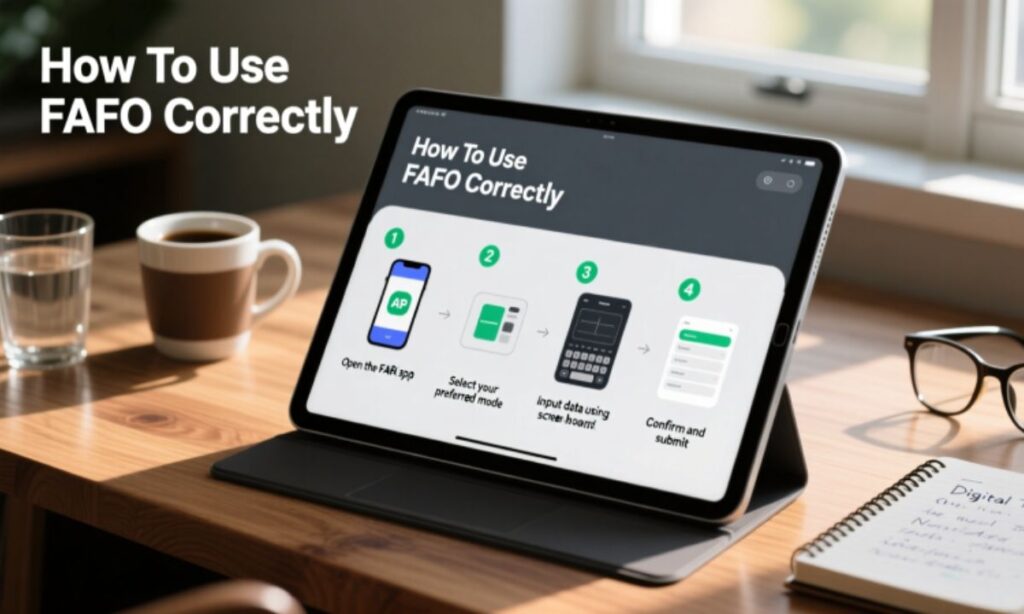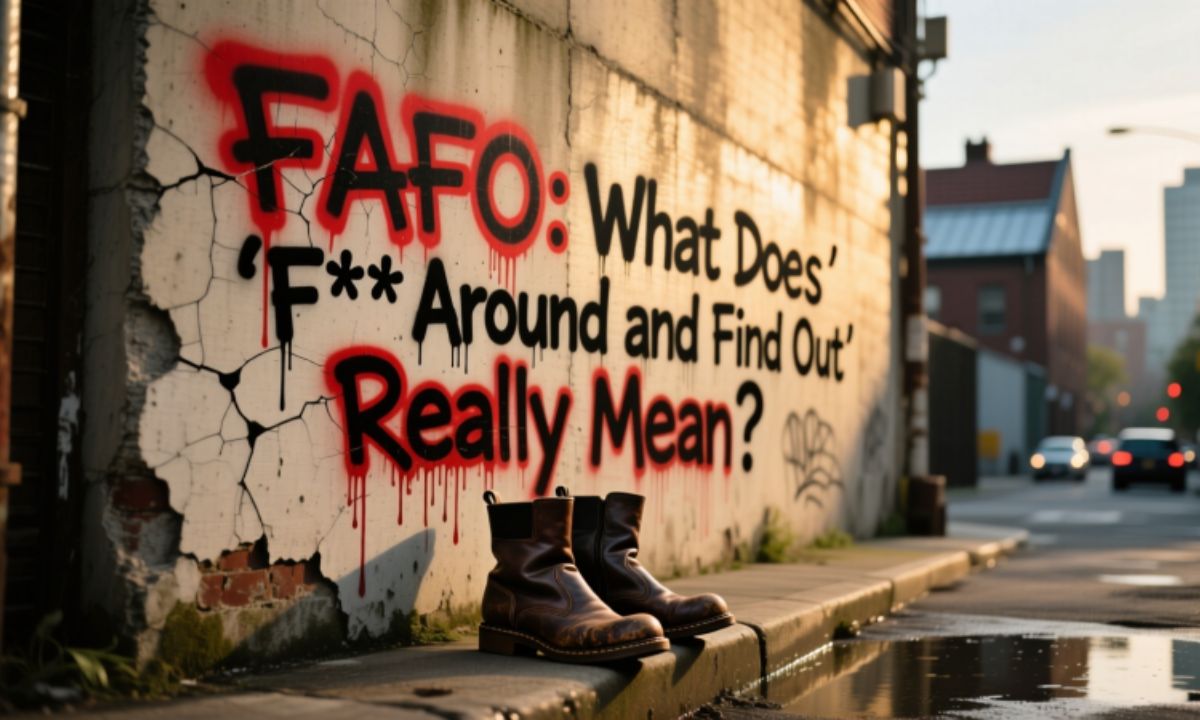The phrase FAFO has become one of the internet’s most talked-about slang terms. You’ll see it in memes, TikTok videos, and comment sections everywhere. But what does FAFO actually mean, and why do people use it so often? It’s a bold way to say, “If you push limits, you’ll face the results.”
Over time, FAFO has grown from a street slang expression into a viral phrase with political and cultural weight. It shows up in jokes, online arguments, and even serious discussions. Whether it’s meant as a warning or just for laughs, FAFO perfectly captures the internet’s mix of humor and attitude.
What Does FAFO Mean?
FAFO is shorthand for “F*** Around and Find Out.” This slang expression serves as both a threat and a prediction. The phrase essentially warns that someone who deliberately causes trouble will soon experience the negative outcomes of their actions. It’s become popular in texting language, online chats, and social media conversations as a concise way to communicate consequences.
The FAFO definition breaks down into two parts. “F*** around” refers to someone deliberately testing limits, being reckless, or causing problems. “Find out” represents the inevitable consequences that follow such behavior. Together, they create a cause-and-effect relationship that resonates with people tired of tolerating foolishness.
This acronym has evolved beyond simple internet slang. It’s become a cultural statement representing self-confidence and refusal to tolerate disrespect. The FAFO phrase works as both a serious warning and a humorous meme, depending on context and delivery.
Origins of FAFO
The FAFO origin story traces back to African American Vernacular English (AAVE) and urban communities. The full phrase “f*** around and find out” existed in street vernacular for decades before becoming an internet sensation. It was commonly used in confrontational situations as a warning against testing someone’s patience or boundaries.
Biker culture and military communities also contributed to popularizing this expression. These groups valued direct communication and appreciated the phrase’s straightforward message. The FAFO expression resonated with people who preferred clear warnings over polite suggestions.
The acronym FAFO gained widespread recognition around 2020-2021. Social media users began abbreviating the phrase to make it more shareable and acceptable for platforms with content restrictions. The shortened version appeared in memes, viral videos, and eventually became merchandise on FAFO t-shirts and other products.
Is FAFO Political?
FAFO has become increasingly associated with political discourse, though it wasn’t originally political. Various political groups have adopted the phrase to express defiance against opponents. Conservative movements frequently use FAFO as a political slogan on flags, bumper stickers, and rally signs.
The phrase’s connection to Second Amendment supporters and libertarian movements has strengthened its political identity. Many interpret the FAFO political meaning as a warning about overreach or attempts to infringe on rights. However, liberals and progressives also use the expression in different contexts.
Despite its political appropriation, FAFO remains fundamentally non-partisan. The phrase represents consequences for any action, regardless of political ideology. The controversy surrounding its political use stems from how different groups weaponize it against opponents rather than the phrase itself.
| Political Context | Usage Example |
| Conservative rallies | Warning against government overreach |
| Progressive movements | Consequences for policy decisions |
| Libertarian messaging | Individual rights protection |
FAFO in the Military and Law Enforcement
Military slang embraced FAFO long before it became mainstream. Soldiers and veterans use the phrase to describe combat situations where enemy forces miscalculate their opponents’ capabilities. The military context gives FAFO a serious, sometimes deadly connotation.
Law enforcement communities adopted similar usage. Officers might use FAFO when discussing suspects who resist arrest or escalate confrontations. In these professional settings, the phrase serves as shorthand for explaining how situations deteriorate when people make poor choices.
The tactical community has incorporated FAFO into training discussions and military humor. Veterans often wear FAFO shirts as a badge of experience, signaling they’ve witnessed firsthand what happens when situations go wrong. This usage maintains the phrase’s original warning intent while adding gravitas from real-world consequences.
Why Is FAFO Trending on TikTok and Social Media?

TikTok transformed FAFO into a viral trend through countless videos demonstrating consequences. Creators use the FAFO hashtag when sharing stories about people who ignored warnings and suffered predictable outcomes. These videos range from humorous to serious, but all follow the cause-and-effect formula.
The meme format makes FAFO highly shareable. People create content showing someone’s risky behavior followed by immediate consequences, adding the FAFO acronym for emphasis. These TikTok videos garner millions of views because audiences love watching karma unfold.
Social media platforms beyond TikTok have embraced the trend. Twitter threads, Instagram stories, and Facebook posts frequently feature FAFO examples from daily life. The phrase’s versatility allows it to describe everything from minor inconveniences to major life lessons, making it perfect for online usage.
FAFO Across Different Contexts
FAFO context meaning varies dramatically depending on setting and tone. In casual conversation, it might be a joke about someone ignoring obvious warnings. In serious discussions, it becomes a genuine caution about dangerous behavior. Understanding these contextual shifts is crucial for proper usage.
Workplace scenarios might involve FAFO discussions about employees who repeatedly violate policies. Dating contexts use the phrase when discussing relationship boundaries and deal-breakers. Even parenting communities employ FAFO when talking about children learning from natural consequences.
The cultural meaning extends into sports, business, and entertainment. Athletes “FAFO” when they underestimate opponents. Companies experience it when ignoring market trends. The phrase’s flexibility across domains demonstrates its fundamental truth about consequences.
Common FAFO Contexts:
- Personal relationships and boundary violations
- Professional misconduct and workplace dynamics
- Political actions and policy consequences
- Social media arguments and online disputes
- Physical confrontations and self-defense situations
FAFO in Text Messaging and Online Chats
Texting made FAFO even more convenient for digital communication. The acronym fits perfectly into character limits while conveying strong sentiment. People use it in group chats, direct messages, and comment sections to quickly express the consequences concept.
Online chat culture has standardized FAFO as recognizable shorthand. You’ll find it in gaming communities, Discord servers, and Reddit threads. The abbreviation allows users to reference the full phrase without typing profanity, making it somewhat platform-appropriate.
Different tone variations change FAFO’s impact in text. All caps (FAFO!) adds emphasis and urgency. Lowercase (fafo) seems more casual or humorous. Adding emojis or context clues helps clarify whether the message is playful or serious.
Controversies and Misunderstandings
The FAFO controversy centers on its aggressive tone and profanity. Critics argue the phrase promotes violence or vigilante justice. Supporters contend it simply acknowledges reality: poor choices lead to bad outcomes. This debate has intensified as the phrase gained mainstream attention.
Misunderstandings occur when people interpret FAFO as a direct threat rather than a general principle. Some organizations and platforms consider it threatening language worthy of content warnings or removal. Others defend it as protected speech expressing frustration or setting boundaries.
The phrase’s appropriation across different communities creates additional tension. When groups with opposing viewpoints both use FAFO, it can escalate conflicts rather than resolve them. The Urban Dictionary entries for FAFO reflect these varied interpretations and controversial applications.
How To Use FAFO Correctly

Using FAFO properly requires understanding your audience and context. In casual settings with friends who appreciate edgy humor, the phrase fits naturally. In professional environments or with unfamiliar audiences, it’s usually inappropriate regardless of intent.
Tone matters significantly when deploying FAFO. Playful usage in response to minor situations maintains humor without seeming aggressive. Using it in genuinely threatening situations crosses ethical lines and could create legal problems.
Written communication demands extra caution with FAFO. Without vocal tone or body language, readers might misinterpret your intention. Consider adding context clues, emojis, or explanatory text when using the acronym in messages or posts.
Related Terms and Acronyms
Similar expressions convey related messages about consequences. “Play stupid games, win stupid prizes” offers a less profane alternative. “Talk shit, get hit” is more aggressive and confrontational. “Karma’s a bitch” focuses on cosmic justice rather than direct causation.
Internet slang continuously evolves alongside FAFO. Terms like “cope,” “seethe,” and “ratio” serve similar functions in online discourse. Each carries distinct connotations but shares the underlying theme of consequences for actions or statements.
Acronym variations include FAAFO (adding an extra “around”) for emphasis. Some communities have created sanitized versions like “Mess Around and Find Out” (MAAFO) for family-friendly contexts. These alternatives maintain the concept while reducing offensiveness.
Frequently Asked Questions
What does FAFO stand for?
FAFO stands for “F*** Around and Find Out,” warning that reckless actions lead to consequences.
Is FAFO appropriate for professional settings?
No, FAFO contains profanity and carries an aggressive tone unsuitable for most professional environments.
Where did FAFO originate?
FAFO originated in AAVE and urban communities, later spreading through military circles and internet culture.
Why is FAFO controversial?
FAFO’s aggressive tone and profanity make some view it as threatening, while others see it as acknowledging consequences.
Can FAFO be used humorously?
Yes, FAFO often appears in humorous contexts when describing minor consequences or obvious karma situations.
Conclusion
FAFO represents more than just internet slang it’s a cultural statement about accountability and consequences. The phrase has evolved from street vernacular to mainstream expression, crossing political, social, and generational boundaries. Whether you encounter FAFO on social media, merchandise, or in conversation, understanding its meaning helps you navigate modern communication.
The staying power of this acronym demonstrates how digital culture shapes language. While controversial and profane, FAFO efficiently communicates a universal truth: actions have consequences. As the phrase continues trending across platforms and contexts, its cultural significance only grows stronger, cementing its place in contemporary slang vocabulary.

James Smith, the admin of Birthdaystrendz, crafts cheesy, flirty, and romantic pick-up lines with meaning. A wordsmith spreading joy and charm!

